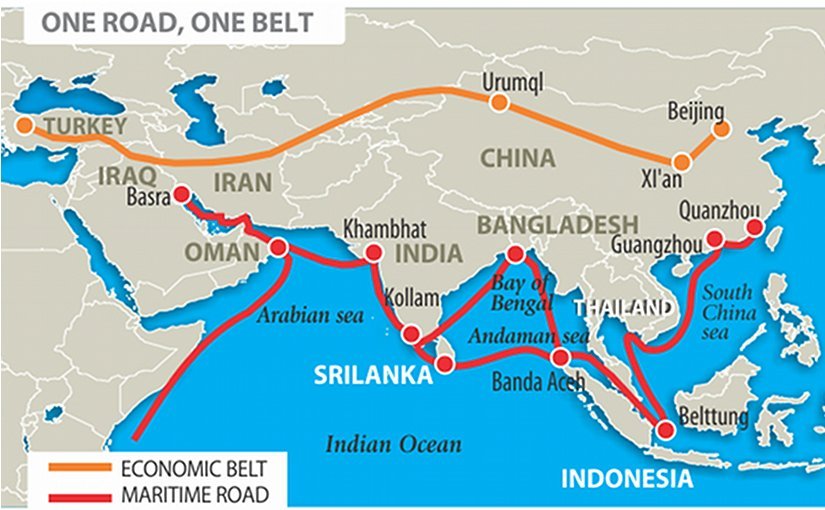By Kanwar Muhammad Javed Iqbal
In various pre-sessions during Rio+20 i.e. Earth Summit 2012, I noticed critical viewpoints especially of western speakers and participants about China’s emerging dominance. Perhaps, it was a deliberate act by the market forces that tried to build a market monopolization narrative against China. On other hand, global consumers seemed in a comfortable zone with China’s competitive market prices and availability of different category of economic goods in the form of door-step solutions worldwide. Due to higher standards in western economy, production cost is relatively higher than China thus certain limitations come across in maintaining and competing the Chinese market. The global poverty level entails the need to support Chinese role in global market system.
There is growing fear that the same instrument can also be used by different market forces for propagation of market fear once again in the context most promising China’s Belt and Road Initiative (BRI) which is an ambitious long-term integration and cooperation vision for the Eurasian continental landmass, Africa, maritime corridors and beyond. BRI envisages a plan that will alter the dynamics of geo-economics and geo-politics critically important for modern globalization trends around the globe in general and Indian Ocean Region (IOR) in particular – a potential Sino-Asian shift.
The project aims to integrate IOR nations which will result in equal opportunities of the economic development of participating countries. China-Pakistan Economic Corridor (CPEC), the flagship project, is an important link to the BRI thread which offers Pakistan with wide range of opportunities of economic, social and strategic developments. Over period of time, geo-economics of IOR has got tremendous importance due to trade potential and associated needs of China, Pakistan, India, Iran, Afghanistan and other nearby states.
There is need to promote regional integration between the countries in order to safeguard the interests of humanity at large and meet the milestones of United Nations Sustainable Development Goals. But, probably, the international geo-political ties of United States has limited the level of cooperation in IOR in order to harness the true economic benefits for the region at large, due to strategic competition between China and United States.
BRI win-win scenario entails the need of greater cooperation between the key players in IOR. Chahbahar and Gwadar Ports can be the sister ports by developing a synchronized work environment, in order meet the huge operational requirements under BRI. Probably, it is not favorable for other international geo-political players in the region thus efforts are quite visible for an extended role of India other than the trade interests, which is infact an un-natural attempt considering the history of IOR but being pushed, jeopardizing the traditional security of the region.
There is growing consensus among professionals across world that the success of BRI would be significant in maintaining historic values of IOR especially promoting peace, uplifting human civilization, and contributing greatly towards the prosperity and sustainable development by promoting the connectivity of Asian, European and African continents and their adjacent seas. Chinese Government has done a wonderful job in developing and putting in practice a risk management strategy during the course of BRI. Including BRI in constitution by the Chinese Communist Party and operationalizing BRI Gateway through Gwadar Port are important steps to maintain investment trust and strengthen regional economies. Pakistan has faced the challenges of longest downturn in its history and serious macroeconomic imbalances.
For national aspirations to become reality and to maintain higher growth rate of economy, the National Economic Council approved Pakistan’s Vision 2025 on 29 May 2014 to serve as a critical guide-post for the development of an effective strategy and road-map to reach national goals and aspirations, and also linked CPEC and Gwadar Port to it which would play significant role. The value of CPEC infrastructure projects, originally valued at $46 billion, is now worth over $62 billion.
CPEC is rightly considered as a game changer not only for Pakistan but also for the whole region as it bears the dividends of economic development for all. With the operationalization of BRI through CPEC, maritime activities would increase exponentially in North Arabian Sea and beyond. The development of CPEC and use of Gwadar port has direct bearing on the maritime security responsibilities and challenges. Consequently, the responsibilities of Pakistan Navy would also increase for addressing traditional and non-traditional security challenges and maintaining a secure maritime environment for free flow of sea trade along BRI routes to and from Pakistan.
Understanding the dynamics of Sino-Asian shift and taking direction from Chinese measures in the context of BRI, development and implementation of a Comprehensive Risk Management Strategy for CPEC and Gwadar is critically important and need of the hour for Pakistan. It is pertinent to consider China’s dominating posture throughout the globe for its economic goods and setting modern globalization trends thus Pakistan may experience a potential threat indirectly from existing market forces. The Risk Management Strategy of Pakistan needs to include and launch more coordinated advocacy campaign at national, regional and international level in order to safeguard its interest of socio-economic uplift in the area which is quite marginalized over a period of time. The “Islamabad Declaration and Vision 2025” as conclusion of the 13th Summit of the Economic Cooperation Organization (ECO) can be instrumental, diplomacy needs to be strategized on priority basis.
The latest developments by Pakistan Navy have shown its proactive approach in its initiatives for ensuring order at sea. Raising of a dedicated Task Force-88 and collaborative maritime security engagements with regional and extra-regional navies signify the PN’s resolve for provision of safe sea routes. PN’s endeavours for security of CPEC and BRI will be instrumental in long-term success of the projects. Government of Pakistan must be well aware of security needs of Pakistan Navy and meet them on priority.
Senior Policy Researcher at Institute of Maritime Affairs, reachable at kanwar.javediqbal@gmail.com.


